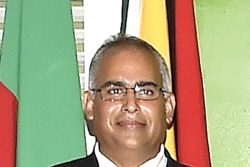Dear Editor,
Mr. Vincent Alexander’s letter published on 11/19/2022 in the Stabroek News, under the caption “No mechanism has been activated to remove dead persons from the voters’ list”, allows me the opportunity to put the coup de grâce on the ‘bloated’ list’ debate. Mr. Alexander is demonstrably more adept than Messrs. Aubrey Norton and Sherwood Lowe on the legal issues pertaining to the voters’ list, and in particular, regarding what cannot constitute ‘bloat’ on that list. I am fortified in this view by Mr. Alexander’s omission to respond to my key and critical contention that persons lawfully on the list cannot constitute ‘bloat’. I construe that omission to be both a recognition and an acknowledgement of the unassailability of my legal contention.
Unfortunately, Mr. Alexander dilutes his letter by his approbation of Regulation 40 promulgated under the National Registrations Act in 2005. He fails to appreciate that insofar as that Regulation authorises the removal of names from the National Register of Registrants (NRR) on the basis of residency, it collides with the Constitution and is unlawful, null, void and of no effect. In any event, the ratio decidendi of the Chief Justice’s ruling on this issue in 2019, to which repeated reference has been made on previous occasions, has likewise outlawed that Regulation. Mr. Alexander concurs with me that dead persons are disqualified from the list and ought to be removed. He and I are ad idem on the pivotal issue that those names constitute ‘bloat’. However, any alleged failure of the Chief Registration Officer to cleanse the list of those persons is a matter for which Mr. Alexander cannot escape responsibility.
The registration of citizens, the de-registration of those disqualified, and the preparation of a voters’ list are all part of the duties of the Guyana Elections Commission (GECOM) imposed by the Constitution. Mr. Alexander is the most senior Commissioner at GECOM and perhaps one of the longest serving members on that Commission since its creation. A post, for which he is remunerated. Therefore, he cannot adopt the posture of an officious bystander proffering critical commentary. Rather, he should plead mea culpa and claim at least partial responsibility for the problem. Were he diligently prosecuting this cause during his protracted tenure at GECOM, we may not be having this exchange.
In respect of the removal from the list of persons who have died within the jurisdiction, the Government’s proposed statutory reforms will create a network of duties devolving upon the Registrar of Births and Deaths, the Chief Medical Officer and the Commissioner of Police, to supply information regarding deceased persons to the Chief Registration Officer at periodic intervals. The latter two officers will furnish information that will enable the system to capture deaths not registered with the former. Additionally, information received pertaining to these unregistered deaths, will be published by the Chief Registration Officer and become part of the Claims and Objections mechanism, thereby providing an opportunity for political parties, as well as the public, to play a part in sanitising that information. A criminal offence with a hefty penalty is created for the non-removal of known dead persons from the Register.
This wide array of measures ought to comprehensively address the removal of local dead persons from the NRR. Mr. Alexander also raises the thorny issue of the absence of a mechanism to remove from the database, persons who have died overseas. He raised this very issue last month at the Government’s public consultations on statutory electoral reforms held at the Arthur Chung Conference Centre. As I candidly said to him then, and I reiterate now, I cannot conceive of a measure to address that dilemma at this point in time. There is simply no institutional framework which exists between Guyana and its diaspora through which such data can be accurately collected and transmitted. As I did then, I hereby repeat my request for Mr. Alexander to recommend a mechanism which can be utilised for that purpose. The fact that he did not offer one then, and does not offer one now, conclusively demonstrates that he has none to offer.
However, the solution cannot be to disenfranchise tens of thousands of living persons by removing their names from the list, because of an inability to remove a segment of dead persons therefrom. This dilemma is neither unique nor peculiar to Guyana. It obtains throughout the Caribbean where the registration system is similar. Like us, they have not resorted to the disenfranchisement of qualified electors in order to remove dead persons from their databases.
This brings me to the final issue raised by Mr. Alexander. It is the alleged nexus which Mr. Alexander makes between dead persons on the voters’ list and voter impersonation or fraudulent voting. Mr. Alexander makes a gargantuan leap by suggesting that the presence of dead persons on the list results in fraudulent voting, presumably, by voter impersonation, as it is obvious that dead persons cannot vote. This is an unfounded and fanciful conclusion, which Mr. Alexander’s political party continues to make and propagandise as the basis for their loss at the March 2020 elections. They continue to peddle the excruciatingly nonsensical narrative that some 15,000 ballots were cast at the 2020 Elections in the names of deceased/migrant persons on the list by impersonators on E-Day. How this monumental feat of thousands of persons voting multiple times could have occurred without being detected by APNU/AFC leaders/ activists and supporters, members of the public, Election Observers, the Press, the Guyana Police Force, the Presiding Officers, Assistant Presiding Officers, Polling Clerks, Polling Agents for each political party, and indeed, the entire GECOM machinery, remains a befuddling mystery of gigantic proportion. That all of these allegedly fraudulent votes were only in favour of the PPP and that they totaled the same number of votes that the PPP received over and above APNU/AFC, adds greater bewilderment to this hair-raising saga.
Were one to follow the plot line of this cryptic tale, it means that after voting for himself, each impersonator would then have voted multiple times (perhaps hundreds), as they the case may be. Every voter knows his name will be identified on the list of electors at the Polling Station by a Poll Clerk. The voter produces an acceptable form of ID or swears an oath of identification. This is checked against a folio containing the personal information of the voter, including a photograph. This folio is in possession of all the staff in that Polling Station. When the elector’s identity is confirmed, his name is then ticked off on the list of electors in possession of each staff in that Station. After voting, his index finger is then stained with an indelible ink – all of this taking place within the full view of a Presiding Officer, an Assistant Presiding Officer, a Poll Clerk and multiple Polling Agents representing the political parties. It is APNU/AFC’s contention that this person then returned, possibly dozens, hundreds or thousands of times during the course of that very day and voted multiple times for other persons without detection! Just imagine this occurring 15,000 times in a 12-hour period across the country in broad daylight! This is the level of asininity to which the APNU/AFC have descended.
In conclusion, there is absolutely no evidence to suggest that the presence of dead people on the list results in voter impersonation or fraudulent voting. There are sufficient checks and balances in place which are going to be furthered strengthened by amendments already tabled in the National Assembly, along with the creation of a series of offences carrying penalties as high as 10 years’ imprisonment, to prevent voter impersonation.
Sincerely,
Mohabir Anil Nandlall, SC MP
Attorney General and Minister of Legal Affairs






